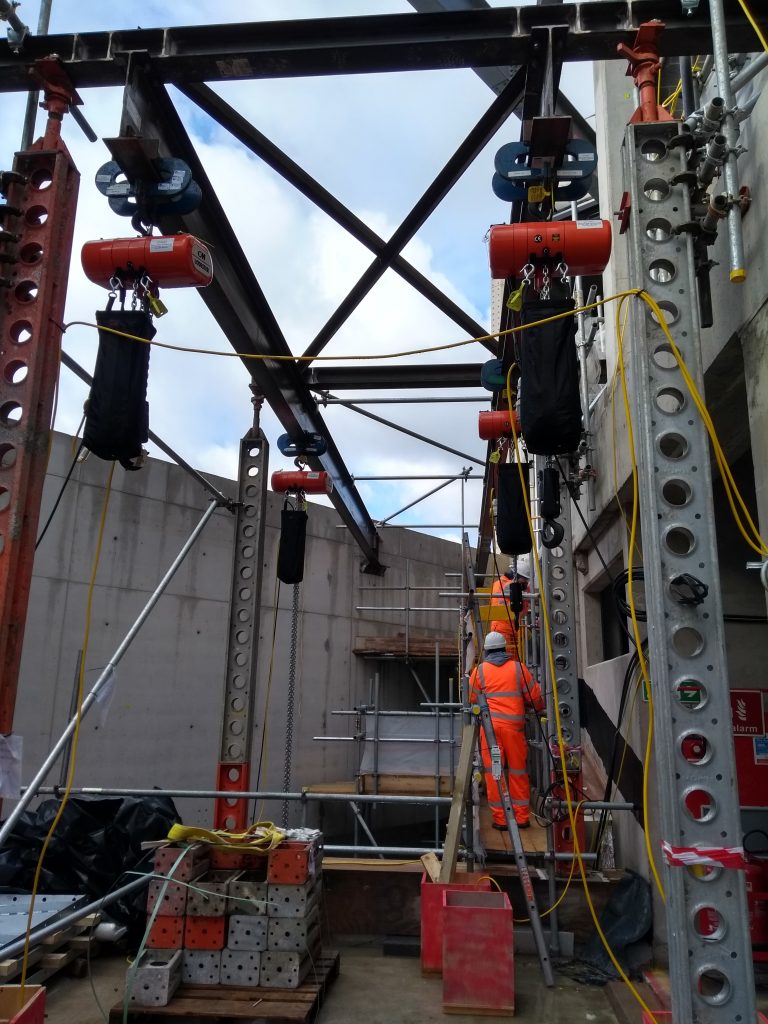Rope and Sling Specialists Ltd. (RSS) has completed proof tests on three runway beams at the Durward Street shaft site, part of Contract C512, a main station contract worth £110m, awarded as part of Crossrail, Europe’s largest infrastructure scheme. RSS accepted a scope of work to test newly installed, temporary beams at two locations—Levels 1 and 3—that will be used to lower parts for escalator installations. This part of the project principally covers the implementation of internal and external walls alongside new staircases, escalators, and lifts for passengers to get to and from platforms. At Level 3, RSS performed a 4t proof load test on a 3.2t working load limit (WLL) beam, while the assignment at Level 1 involved a gantry system comprising two beams that provide a total lifting capacity of 8t. Each beam had a proof load of 5t applied for the tests, which were covered by Lifting Operations and Lifting Equipment Regulations (LOLER) and will be subject to six-monthly inspections for the duration of the project. The gantry system at Level 1 is used at an incline for moving escalators into place. Graham Dawson, RSS depot manager, explained that the beams were all the same depth and width but different lengths. The beam on Level 3 was a 5.25m x 457 x 152 beam; at Level 1, the first beam was 13m x 457 x 152 and the second was 10.85m x 457 x 152. To conduct the tests, the Level 3 beam was fixed via bolts to a concrete floor, whereas brackets and strong backs combined at the other location, Dawson said. He added: “We had already spec’d the job two days earlier; we were onsite over a three-week period to conduct six-monthly LOLER tests on the project’s lifting gear. Ian [Thompson, RSS engineer / surveyor] and I were asked to complete the work at Level 3 first, as the pulling plate had been installed onto the floor in advance. The plate was used on three beams; we took measurements of the beam for the deflection readings, and checked the fixings to make sure they were correctly installed.” Once an exclusion zone was in place the RSS team installed a trolley, 5t chain block, 5.3t collar chain, and load cell via shackles to complete the test. The Straightpoint (SP) 10t capacity wired load cell was utilised with a Handheld plus reader, while a Leica laser-measuring device read beam deflections. The first deflection reading was taken from the floor to the beam, before various loads were put on the beam and subsequent readings recorded. The process was repeated at Level 1. Upon completion of the tests four electric chain hoists and trolleys, sourced from RSS, were attached to the beam for lowering of the escalators. Connecting the City, Canary Wharf, the West End and Heathrow Airport to commuter areas east and west of London, Crossrail is a major new rail link project designed to provide a world-class, affordable railway with high frequency, convenient and accessible services across the capital. BBMV, the joint venture encompassing Balfour Beatty, Morgan Sindall and VINCI Construction, will be constructing the project in three distinct parts including refurbishment of the existing Whitechapel Station in the Hammersmith & City and District Line cutting, the new station bridge concourse above the East London Line cutting and the new ticket hall behind the retained building fronting on Whitechapel Road.







